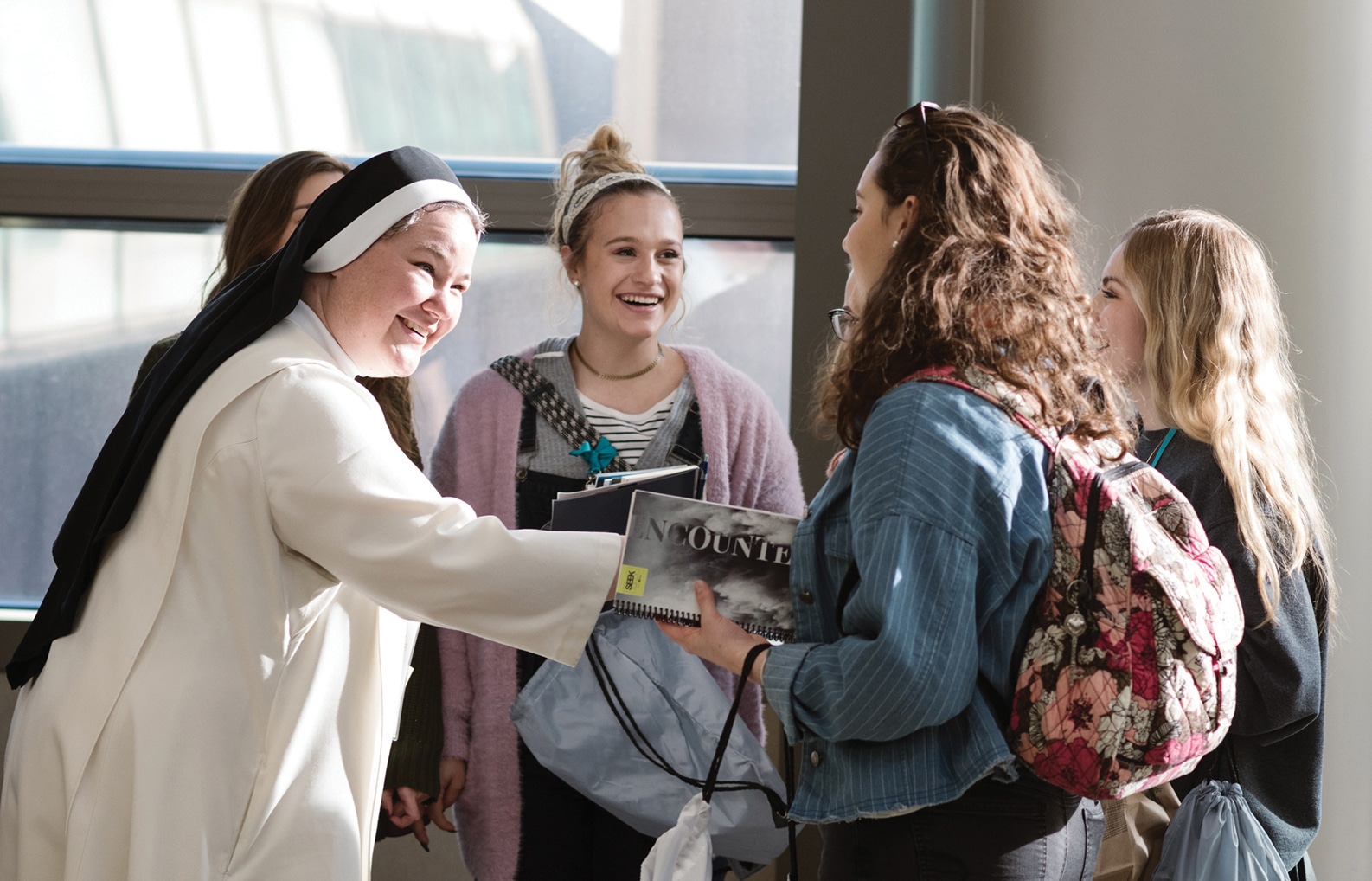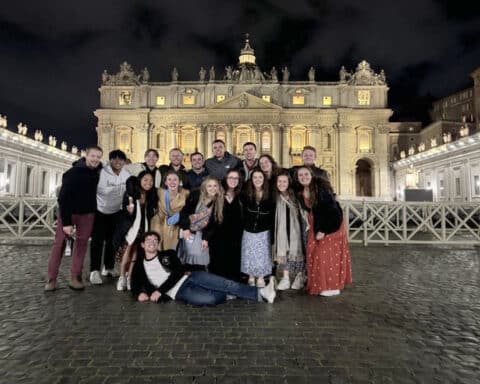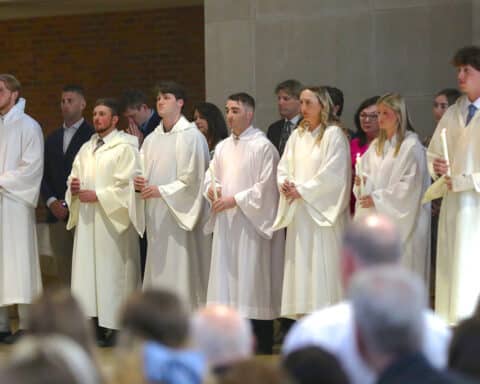Catholic chaplains want the campus ministry center to be a comfortable setting for college students, a place where they can feel at home.
At the same time, they don’t want those students to never get off the couch, either.
“You don’t want them so comfortable that they never leave, or that their only friends are Catholics, because that would not be faithful to the Gospel,” said Michael St. Pierre, the executive director of the Catholic Campus Ministry Association.
St. Pierre spoke to a reality experienced by many Catholic college students on Catholic and secular campuses who want to hold on to their faith, grow spiritually and surround themselves with like-minded peers.
After all, the college years present a host of opportunities, challenges and pitfalls to Catholic young adults who take their faith seriously. Faithful Catholic students often find invaluable support through campus ministry programs and faith-based student organizations.
“The greatest service a campus ministry does is that we call these students into community, not simply at a human level but at a divine level as well,” Franciscan Father Jude DeAngelo, the campus chaplain and director of campus ministry at The Catholic University of America, told Our Sunday Visitor.
| Additional Reading |
|---|
|
Read more articles from our fall Catholic college section here.
|
At the same time, there can also be a risk of the faithful Catholic college student falling into a bubble where one only associates with like-minded people, or solely engages in “Catholic” activities.
“There is definitely a tension where some campus ministry centers are so good that students don’t want to leave them,” said St. Pierre, who also told OSV that college chaplains know it is part of their job to get the students involved in the wider campus community.
“Ultimately, you want to find ways for those students to serve, to mingle and to be out on campus,” St. Pierre said.
‘Typical college experience’
In interviews with OSV, several campus ministers, chaplains and Catholic university officials emphasized the importance of students being able to balance their faith life with everything that comes with the college experience, such as internships, campus community events, socializing and service opportunities.
“You want (students) to be successful, and part of that is learning how to have those balances between their intellectual developmental as a student, their social life outside of the classroom, and also their own physical and mental health developments,” said Michael Lovell, president at Marquette University.
“Very often, our student leaders on campus are balancing both worlds really well,” said Katie Jennings, the associate vice president for student engagement at The Catholic University of America. Jennings said many of those students are “very faithful,” are involved in campus ministry and faith-based student organizations, but are also “your average college students.”
“Our students are normal 18-24 years olds. They’re like every other college student on every other campus,” Jennings said. “They struggle with the same things — alcohol, drugs, sex. The demons are all the same.”
Jennings emphasized that the faithful student leaders at CUA show how it is possible for a Catholic student to live a healthy faith-life balance during their college years.
“Our students get all the big internships downtown,” Jennings said. “They are working in the restaurants in the city. They’re maintaining a nightlife. They’re planning events for their student (organizations). They’re debating the hot-button issues of the day. They’re having a very typical college experience.”
Multiple communities
Caitlin McHenry, a student at Quinnipiac University in Hamden, Connecticut, told OSV that it is “definitely a big challenge” to balance the demands of the spiritual life as well as academics and having an active social life on campus.
“It’s not something I’ve mastered or expect to fully master anytime soon,” said McHenry, who is on the leadership team in the Catholic campus ministry program at Quinnipiac.
“I think a big thing that people learn in college is how to budget and prioritize their time,” McHenry told OSV. “For me, my top priorities are academics, my spiritual life and social life. Going to class during the week and Mass on weekends are two things I will never sacrifice for other things.”
However, McHenry emphasized, that does not mean that she never goes out to dinner with friends or to the movie theater. Even in the campus ministry program, she and other team leaders organize fundraisers and events to engage the wider Quinnipiac community.
“I try actively to be a mentor to others, to be a Christian witness and to help promote our Christian values on campus,” McHenry said.
Simone Payette, a student at Stonehill College, a Catholic college in Easton, Massachusetts, is also involved in the campus ministry program, which attracts Catholics, Protestants and even non-Christians.
“While I’m surrounded by a lot of Catholic people, those are not the only people I’m around,” said Payette, who is also a member of the campus-ministry chapel choir, which includes non-Catholic members.
“I definitely get a lot of different perspectives even being involved in campus ministry,” Payette said. “I try to be involved outside of the campus ministry. There is definitely a balance you have to strike there. College is a time of growing and exploring and learning about other perspectives different from your own.”
Challenges to living out faith
Of course, college also can be a challenging time for Catholic students who want to grow in their faith. Toxic peer pressure, casual sexual mores, the party scene and ideologies that contradict Catholic moral teachings are just a few of the challenges and potential pitfalls facing students.
“I think it really depends on the person. Some are better equipped to deal with peer pressure than others,” said Joseph Silveira, a student at the University of Massachusetts Dartmouth. Attending a secular public campus, Silveira described often “seeing and hearing” things that directly challenge his Catholic convictions.
“It can be challenging, even maddening, when someone comes up to you and asks you to sign something that you don’t agree with,” Silveira said. “But I have to remember that everybody has free will and can do what they want. I have to respect that, even if I don’t agree with it.”
Ben Reiss graduated this past spring from Suffolk University in Boston, which was the first time he had ever attended a non-Catholic school in his life.
“There were no religion classes. There were no morning prayers. It was definitely very different not having that kind of religious presence in the classroom,” said Reis, who is preparing to attend the University of Massachusetts School of Law.
While he was in undergrad, Reis said he nurtured his Catholic faith by getting involved in a nearby parish off-campus. He became an active member of that parish community, which provided critical support, because he did not see many active Catholic groups on campus.
“I found a deeper connection to the Catholic faith more or less on my own. It wasn’t because someone told me to believe it. Inside, I really believed in the Faith,” Reis said.
In nearby Cambridge, Massachusetts, Peter Nguyen, a FOCUS campus missionary at Harvard University, told OSV that he has learned it is “very possible” to have a fulfilling college experience while thriving in one’s Catholic faith.
“Having your priorities straight is important,” Nguyen said. “A lot of students will waste time on things that don’t bring them joy, fulfillment and happiness. But making time for prayer and the sacraments, having good, meaningful relationships in your life that lead you to virtue will bring you joy and inner peace.”
When he was an undergraduate student at Tulane University in New Orleans, Nguyen said he learned over time how to prioritize his Catholic faith while attending classes and participating in extracurricular activities.
“I was able to cultivate friendships that are thriving now even after college,” Nguyen said. “I was able to participate in all the extracurricular activities I wanted to. I was also able to pray for an hour a day and go to Mass every single day. I was even able to lead Bible study. In the end, once I prioritized and knew what I wanted, everything fell into place. But unfortunately, I think a lot of students don’t really know what they want.”
At Marquette, Lovell said the university emphasizes service for others, and he added that students at Marquette in a given year put in more than 550,000 hours of community service.
“We really want those students who are actively engaged in their faith to really try to become leaders in other ways on campus,” Lovell said. “We do provide training for students to help them learn how they can become leaders, help them become important members of our community beyond what they do individually.”
Tool of socialization
Father DeAngelo, the campus chaplain at The Catholic University of America, said that socialization is “a basic tool” of evangelization. He emphasizes to students that Christ is present when they are studying, working at an internship or socializing with friends.
“Our hope is that our students will not only be good Catholics who go to church on Sundays, but that when they graduate they will take up the Holy Father’s call to become missionary disciples and transform the culture,” Father DeAngelo said.
“You present a student with this ideal,” Father DeAngelo added. “You tell them, ‘You know what? You can be this wonderful, happy young person. You can have great friendships and have great opportunities to play a sport and land an internship. But remember, Christ dwells in you, and you will encounter him in others.'”
Being involved in campus ministry encourages many Catholic young adults such as Payette to stay close to their faith. While providing a nurturing community, campus ministry also can offer opportunities to branch out and engage people living on the margins of society.
Over spring break last year, Payette and other students in the Stonehill College campus ministry program traveled to Phoenix to serve the homeless community there.
“And a majority of the people who went on that trip weren’t even Catholic,” Payette said.
Brian Fraga is a contributing editor of Our Sunday Visitor.





